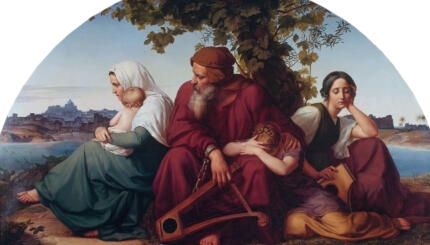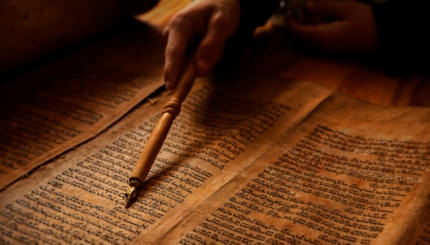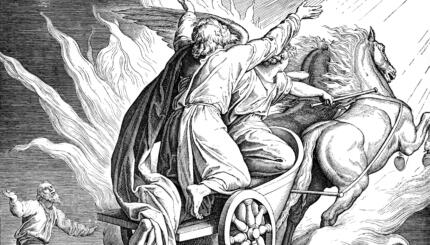This article is excerpted from The JPS Bible Commentary: Haftarot. It is reprinted with permission from the Jewish Publication Society.
The selection of a haftarah for Simchat
has clearly evolved. According to the Talmud, ancient Babylonian practice concluded the annual Torah lectionary cycle on the ninth day of the
festival season (the second day of Shemini Atzeret) with a haftarah from I Kings 8:22ff. (B. Megillah 31b)–thus correlating Moses’ blessing before his death (in the Torah’s final parashah, Ve-zot Ha-berakhah) with Solomon’s blessing at the dedication of the Temple.
By geonic times, some Babylonian-influenced communities took their haftarah for this festival day from Joshua 1, and this selection is authorized in the work Halakhot Gedolot attributed to R. Yehudai Gaon. Some early medieval European communities practiced a compromise–either reciting three verses from Joshua I prior to reading I Kings 8:22ff., or reciting the initial verses from I Kings 8:22ff. prior to Joshua 1.
The Rokeach; (R. Eleazar of Worms) authorized the sole recitation of Josh. 1:1-18, which became normative among Ashkenazim (see Tur, Orach Hayyim 669). Sefardim recite Josh. 1:1-9, following the practice advocated by Abudarham.
The most likely reason for the choice of Joshua 1 as the haftarah for this occasion springs from an ancient custom (preserved among modem Jews of Babylon and Kurdistan) to read the Prophets and the Writings concurrently with the Torah cycle–and to conclude all three sections of the Tanakh [Hebrew Bible] simultaneously. Just as it is now customary to read from the opening portion of Genesis on the festival immediately after the conclusion of Deuteronomy, we may presume a simultaneous custom of reading from the opening verses of Joshua (the first book of the Prophets) on the festival after concluding the Book of Malachi (the final book of the Prophets).
Over time, this practice took on a life of its own, becoming the official haftarah for Simchat Torah in many communities. In short, it appears that the reading from Joshua 1 was initially intended to parallel the added lection from Gen. 1:1-2:3, rather than being seen as related to the end of Deuteronomy.
A second factor in determining present liturgical practice was presumably the thematic continuity between the death of Moses and the leadership of Joshua. This is evident from references in ancient liturgical poetry. Likewise in the sixteenth century, R. Mordecai Jaffe named the reference to Moses’ death in Josh. 1:1 as the reason Joshua 1 is read after Deuteronomy 34 (Levush Ha-Hur; 669).
A third reason–this time ideological–was offered in the eighteenth century by R. Hayyim Yosef David Azulai; Joshua 1 is read after the Torah is concluded, he opined, to aver that Judaism is not restricted to the Torah alone, but rather that "we believe in our teacher Moses and all the prophets that came after him." Indeed, Joshua 1 marks the beginning of the "chain of tradition" that begins with Moses and continues through the prophets to the Sages (Mishnah,
1).
Yet it also marks a shift from Revelation to Tradition. Moses received God’s Teaching directly–"face to face"–while Joshua inherits it through the mediation of study and interpretation. Joshua becomes the first student toextend Moses’ authority beyond the latter’s death. The new leader’s perpetual recitation of the divine words (Josh. 1:8) actualizes the Revelation for future generations.

Help us keep Jewish knowledge accessible to millions of people around the world.
Your donation to My Jewish Learning fuels endless journeys of Jewish discovery. With your help, My Jewish Learning can continue to provide nonstop opportunities for learning, connection and growth.


